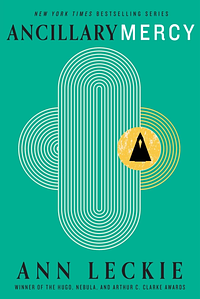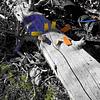You need to sign in or sign up before continuing.
Take a photo of a barcode or cover
That was the ending? Really? It felt more like a cliffhanger (well not quite), maybe a better book two than the real book two (which had seemed, I'd hoped, like a placeholder to get to the interesting stuff in book three).
Book three does get more interesting, but what I wanted more of, what book 1 drew me in with the ideas around distributed personalities. But we only see that from Breq in it's absence, and Anander Mianai is hardly around (though more than book 2). And in the end we learn something tantalizing about her that I really wanted to hear more about.
Then's the ghost gate and the ship on the other side. Plenty of interesting potential there, not of it fulfilled.
Book three does get more interesting, but what I wanted more of, what book 1 drew me in with the ideas around distributed personalities. But we only see that from Breq in it's absence, and Anander Mianai is hardly around (though more than book 2). And in the end we learn something tantalizing about her that I really wanted to hear more about.
Then's the ghost gate and the ship on the other side. Plenty of interesting potential there, not of it fulfilled.
adventurous
medium-paced
dark
funny
reflective
slow-paced
Plot or Character Driven:
A mix
Strong character development:
Yes
Loveable characters:
Yes
Diverse cast of characters:
Yes
Flaws of characters a main focus:
Complicated
funny
hopeful
tense
medium-paced
adventurous
funny
inspiring
relaxing
medium-paced
Plot or Character Driven:
Plot
Strong character development:
Complicated
Loveable characters:
Yes
Diverse cast of characters:
Yes
Flaws of characters a main focus:
No
Bringing together the ideas established across the trilogy, Ancillary Mercy manages to elicit a lot of interesting questions and provide a lot of unsatisfying answers. It's more curious and incisive than Ancillary Sword, but still not as focused and effective as Ancillary Justice.
The book does a lot of work to question and complicate the world that the previous ones established, but ultimately has a limited imagination when it comes to the consequences of empire and . Leckie's strongest suit in this series is the various facets of her world-building in the Imperial Radch, many of which are explicable but raise myriad interesting questions. Her world-building is dense and provocative, but her storytelling within the setting falls flat more often than not in Mercy. Characterization is also thin at this point, despite a few standouts.
The strongest book in the series is still Ancillary Justice, which knows exactly when to stop and resist further resolution, but the followups do provide more exploration of some of the philosophical ideas that can be gratifying.
The book does a lot of work to question and complicate the world that the previous ones established, but ultimately has a limited imagination when it comes to the consequences of empire and . Leckie's strongest suit in this series is the various facets of her world-building in the Imperial Radch, many of which are explicable but raise myriad interesting questions. Her world-building is dense and provocative, but her storytelling within the setting falls flat more often than not in Mercy. Characterization is also thin at this point, despite a few standouts.
The strongest book in the series is still Ancillary Justice, which knows exactly when to stop and resist further resolution, but the followups do provide more exploration of some of the philosophical ideas that can be gratifying.
adventurous
tense
medium-paced
adventurous
emotional
funny
hopeful
inspiring
reflective
sad
tense
medium-paced
Plot or Character Driven:
A mix
Strong character development:
Yes
Loveable characters:
Yes
Diverse cast of characters:
Yes
Flaws of characters a main focus:
Yes
The rating is meant as a 4.5/5 score.
I admire the principled pragmatism of the protagonist. Also, the society portrayed in these books is just lovely to experience: all that military personnel worrying about which set of porcelain would be the most appropriate to serve tea in for the occasion (and everything constitutes an occasion for tea). It's also refreshing to get "she/her" pronouns for every single person, especially coupled with they way the soldiers call the lieutenants and captains "Sir", sometimes in the same sentence. It's a small thing language-wise, but has a huge impact on the feeling of the world.
In true Ann Leckie fashion, the book is mostly build-up and going through societal forms, with only the very smallest doses of action. But those scenes are therefore all the more powerful, even if they're not action scenes told in the classical sense -- the action itself might be "proper action", but the matter-of-fact narrating style of the protagonist gives them a clinical, disassociated feel. Which I don't mind one bit.
The docked half-star comes from the fact that the scale of the plot is somewhat disappointing for the final entry of a trilogy. The second book, Ancillary Sword, was already unexpectedly small-scale, and my feeling is that Leckie could have made more use of her excellent antagonist of the series: for me, the antagonist in this trilogy has the most fascinating antagonist concept across all books I've read so far. High praise, and this book would have been even better with more of the antagonist showing.
Moreover, the story doesn't feel fully resolved. That's perhaps to be expected, given the size of the inhabited universe in these books, but it still feels a bit unambitious.
I admire the principled pragmatism of the protagonist. Also, the society portrayed in these books is just lovely to experience: all that military personnel worrying about which set of porcelain would be the most appropriate to serve tea in for the occasion (and everything constitutes an occasion for tea). It's also refreshing to get "she/her" pronouns for every single person, especially coupled with they way the soldiers call the lieutenants and captains "Sir", sometimes in the same sentence. It's a small thing language-wise, but has a huge impact on the feeling of the world.
In true Ann Leckie fashion, the book is mostly build-up and going through societal forms, with only the very smallest doses of action. But those scenes are therefore all the more powerful, even if they're not action scenes told in the classical sense -- the action itself might be "proper action", but the matter-of-fact narrating style of the protagonist gives them a clinical, disassociated feel. Which I don't mind one bit.
The docked half-star comes from the fact that the scale of the plot is somewhat disappointing for the final entry of a trilogy. The second book, Ancillary Sword, was already unexpectedly small-scale, and my feeling is that Leckie could have made more use of her excellent antagonist of the series: for me, the antagonist in this trilogy has the most fascinating antagonist concept across all books I've read so far. High praise, and this book would have been even better with more of the antagonist showing.
Moreover, the story doesn't feel fully resolved. That's perhaps to be expected, given the size of the inhabited universe in these books, but it still feels a bit unambitious.

